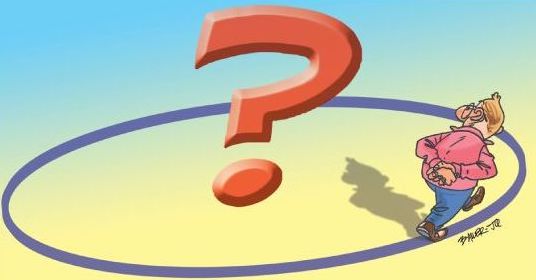Do you want to improve drastically your readings? If I may, I have 2 pieces of advice: work on your questions and answer the question you’re asking without deviating.
The question
Going through my practice and what I see around me, it’s quite evident that most people have a hard time formulating a good question to ask the Tarot or the cards.
Formulating a question is one of the most delicate points in a reading; a wrong formulation is certainly the reason for the biggest cause of errors when doing the interpretation. The reason why readings become difficult to interpret, is often due to an ambiguous question or one that is ill conceived. It is my experience that a clear question gives a clear reading, and a vague question gives vague answers at best.
A question should be clear, simple and precise. It should correspond exactly to what you want to ask, not to what you think you should be asking. Do not try to come with a mega question; it is certainly better to answer a few simple questions, each with a few cards, than doing a single reading, which would be very general.
For instance, do not ask “what will happen to my relationship?”. Wouldn’t it be more interesting to know instead if you are going to be happy in that relationship? Do you care about the relationship, or do you care about being happy in the relationship? After all, moving in a relationship and being unhappy all the time does not seem a good idea. Try to be more precise in what you really want to know. Even better, would be to be proactive and ask “what can I do to improve my relationship?” Open ended, proactive questions are certainly the most useful when getting a reading.
Vague questions such as “what will happen today?” usually do not give useful answers. You’re intending what will happen “to me”, but the question was not mentioning it, the scope is too vague to get something relevant. “How will be my meeting at work today?, or other such questions will certainly give you more useful information.
Conditional questions should be avoided. For instance, “if I get the job will I have a nice career and get a lot of money?” First, that’s 3 questions.Second, the last 2 depend on the consultant obtaining the job, an assumption which might turn out wrong, and render the 2 other questions moot.
Avoid negative questions. Do not ask “are we going to break up”, ask instead “are we going to stay together”. It will certainly be better when using a spread with positive and negative positions, that way a positive card is assigned to a positive meaning, and vice versa.
Put timing into the question. Cards are not very precise to determine when an event will happen. Instead of asking “when will I get married”, it would be better to ask ‘will I get married this year”, for instance.
What about not having a question? If a consultant comes and does not want to ask a question, I will do a general reading, either an astrological spread with the Tarot or a grand tableau with the Petit Lenormand. These spreads specifically designed to pinpoint all the areas in the life of the consultant, and to find out the points where we might need to dig further down later with additional spreads. Except for these, I never do a reading without a question.
Do not ask several times the same question, that would defeat the purpose of doing divination. Asking more than once the same question is just wishing for a particular outcome.
As it is my custom to always ask a question in every article, I asked the Tarot, “What is the impact of a great question on a reading?”

Le Pendu, La Roue de Fortune, L’Empereur.
A great question allows you to move on from being stuck without perspective and take control of the reading. Nuff said, I rest my case.
The answer
Here is probably the best advice anybody could give you: stick with the question when you answer. The cards not speaking about what was asked should be seen as an exception.
Quite often, I see people changing the theme of the reading because such or such card appears in the spread. That’s the typical case why people see in the cards something different than what was asked. For instance, some see the tree in a Petit Lenormand reading and they start involving health. This is simply a misconception of what the concept of the card is, we can talk about a healthy or unhealthy relationship of a financial situation for example, as well as physical health.
Let’s take an example. If we get Fish, Heart, and Lily, depending on the question, we might interpret the following way.

For a relationship, the heart is flowing, giving satisfaction over long term.
For a financial advice, we get a very satisfactory financial situation over long term.
For work, we like the work we do, which is well paid and satisfying long term.
For health, Fish is about liquid, abundance. With the Heart, it can become blood, so we develop high blood pressure over time.
As explained above, the context orients the message of the cards.
A last small piece of advice, be objective. There is a tendency when we read for ourselves or if we sympathise with a consultant, to lose our objectivity. This would not be giving a good service, a consultant does not come for us to sympathise with them, but to reply clearly and objectively to their questions.
Decks: Le Véritable Tarot de Marseille by Kris Hadar, and the Maybe Lenormand by Ryan Edward.
